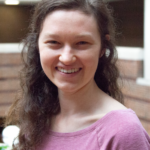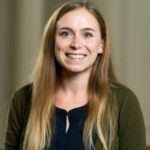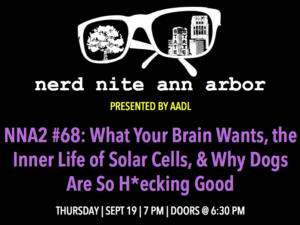What’s brighter than the sun? What’s more complex than the brain?? What’s gooder than a doggo??? NOTHING, that’s what? But ALSO nothing brings them all together quite like Nerd Nite A2!! U-M chemistry grad student Emily Mueller will explain one weird trick to make solar cells last longer. U-M psychology PhD candidate Erin Naffziger will explain how your brain processes craving and desire. Laura Witkowski and Jane Wolff, owners of Good Wolff Dog Training, will talk dog behavior and training. Join us for good times and good company! Bring a friend, grab a drink, and sit back for another great Nerd Nite A2!
When: Thursday, 9/19/19
Doors at 6:30/talks at 7 pm
Where: LIVE, 102 S. First St
Cost: No charge, Ann Arbor District Library’s got this one covered!
 Emily Mueller – A Marvelous Mix: how a key ingredient makes solar cells last longer!
Emily Mueller – A Marvelous Mix: how a key ingredient makes solar cells last longer!
Solar cells help us get energy from the sun, which is a renewable energy source, instead of fossil fuels, which are a finite energy source. But did you know that there is a type of solar cell that can bend? That can be transparent? That could be rolled up and stored in your pocket? These devices are called “plastic solar cells” because they are made with materials similar to plastics. In this talk you’ll learn about how these unique solar cells convert sunlight into electricity. You’ll also discover that these solar cells have a dark side: they wear out quickly (after ~ 2 years)! The reason for this is that there are two ingredients in the solar cell that need to be mixed together for it to function best, but these ingredients separate over time (like oil and water). I add a polymer (a big molecule) to the solar cells that helps the two cell ingredients stay mixed together and makes the solar cells last longer!
About Emily:
I am a 4th year Ph.D. student in the Chemistry department at UM where I make and study polymers for solar cells. I suspect that I may be solar powered myself because I feel best when I am outdoors (swimming, hiking, biking)! I also enjoy reading anything I can get my hands on, cooking things from scratch, and making music.
 Erin Naffziger – The brain ‘wants’ what the brain wants
Erin Naffziger – The brain ‘wants’ what the brain wants
Over the course of evolution our brains have become excellent at detecting rewards (e.g. food or a potential mate) in our environment and in turn generating motivation to obtain that reward. While this system was originally necessary for survival, it can easily become maladaptive in a world where access to rewards (such as high-calorie food, drugs and alcohol, gambling) are present in abundance. Unfortunately, this reward detection system can become hypersentitive in some individuals, in turn causing excessive desire and craving each time they come across a reward cue in their world. In this talk we will address how and why this reward system can become dysregulated in some individuals. Answering these questions will help scientists discover new treatment options for individuals living with addiction or psychiatric disorder.
About Erin:
Erin is a PhD Candidate in Biopsychology at the University of Michigan studying how the brain creates the psychological processes: desire and craving. She wants to know how motivation is generated in the brain and how it may become dysregulated in mental illnesses. When she’s not playing with rats or using lasers to activate the brain, she enjoys true crime podcasts and hanging out with her elderly cat.
 Jane Wolff and Laura Witkowski – Way More Carrot, A Lot Less Stick: How to REALLY be your dog’s best friend
Jane Wolff and Laura Witkowski – Way More Carrot, A Lot Less Stick: How to REALLY be your dog’s best friend
“What is my dog thinking?” There’s a lot of misinformation, pernicious myths, and general confusion about how to train dogs. Understanding how dogs process the barrage of information in their environment is the first step in separating the good from the bad when it comes to dog behavior. We will talk about the two ways dogs learn and how to harness that knowledge to get more of the behaviors you like and less of the ones you don’t – without ever hurting or scaring your dog.
About Jane and Laura:
Jane and Laura of Good Wolff Training are both Certified Professional Dog Trainers and graduates of the highly regarded Academy of Dog Trainers. They use humane, field-tested, science-based methods for dog training and behavior modification. Laura and Jane love working with shelter dogs, teaching group training classes, and helping owners better understand dog behavior and better enjoy life with them. Jane also specializes in separation anxiety and is a Certified Separation Anxiety trainer. Laura is a stand up comedian and has a way of bringing humor and levity to challenging behavior problems. Find them on Instagram @goodwolfftraining.
